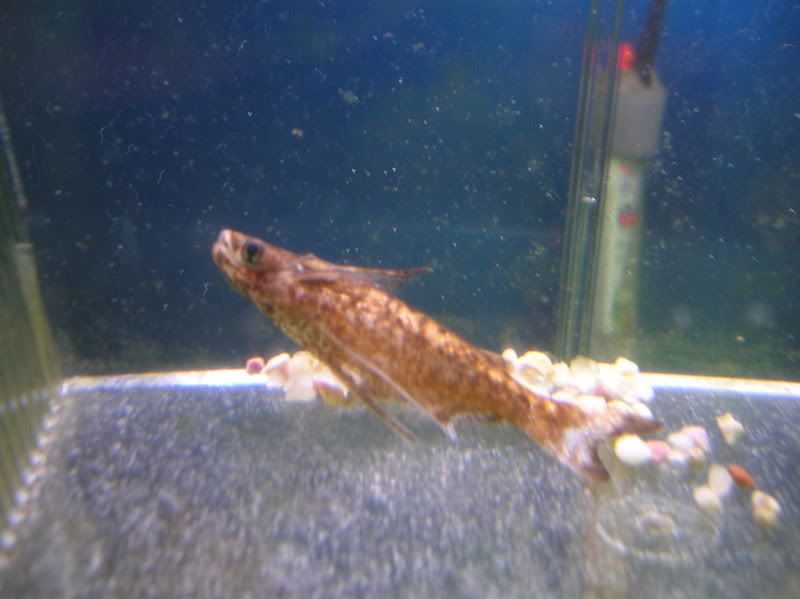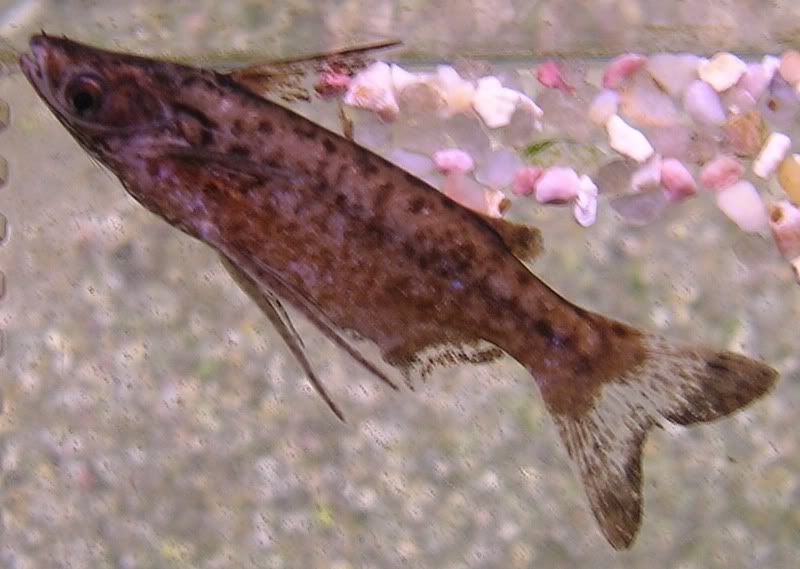Entomocorus species
- Suckermouth
- Posts: 1609
- Joined: 28 Nov 2003, 14:29
- My images: 17
- My cats species list: 22 (i:0, k:0)
- My aquaria list: 2 (i:0)
- My BLogs: 6 (i:0, p:165)
- Spotted: 14
- Location 1: USA
- Location 2: Washington, DC
Entomocorus species
I have purchased what I believe to be a species of Entomocorus. It was labeled as "Tatia catfish" or something at the fish store. It was housed with a number of community fish and swam in the water column (and with the lights on!). This fish also has barbels that are not straight; they look damaged, but based on images of these catfish it seems that it is normal for this genus.
My fish seems to be most similar to . The caudal fin in my fish is rather unusual, though. During the day, the caudal fin appears to have black pigmentation on the upper and lower lobes of the caudal fin (this seems to be unlike the coloration described in ''E. benjamini'', if I'm not mistaken). However, I just checked in on my fish to confirm this (by flashlight), but it appears that this black pigmentation on the caudal fin actually disappears in the dark, save for a little bit on the upper lobe of the caudal fin. Quite strange. As I know it's hard to identify a fish based on pure description, I'll take a picture in the future and try to post it.
On purchase home, it quickly came to my attention that its daytime habits at the store were not its true behavior, as it immediately settled down like any other catfish. During the night, however, it does cruise around quite actively and is happily accepting flake food. All in all, a pretty cool fish, and a nice addition being a catfish species to take up room in at another level of the aquarium; although, I would prefer it if it were more diurnal in habit.
Can anyone tell me anything about this fish?
My fish seems to be most similar to . The caudal fin in my fish is rather unusual, though. During the day, the caudal fin appears to have black pigmentation on the upper and lower lobes of the caudal fin (this seems to be unlike the coloration described in ''E. benjamini'', if I'm not mistaken). However, I just checked in on my fish to confirm this (by flashlight), but it appears that this black pigmentation on the caudal fin actually disappears in the dark, save for a little bit on the upper lobe of the caudal fin. Quite strange. As I know it's hard to identify a fish based on pure description, I'll take a picture in the future and try to post it.
On purchase home, it quickly came to my attention that its daytime habits at the store were not its true behavior, as it immediately settled down like any other catfish. During the night, however, it does cruise around quite actively and is happily accepting flake food. All in all, a pretty cool fish, and a nice addition being a catfish species to take up room in at another level of the aquarium; although, I would prefer it if it were more diurnal in habit.
Can anyone tell me anything about this fish?
-
Marc van Arc
- Expert
- Posts: 5038
- Joined: 19 Dec 2004, 14:38
- My articles: 20
- My images: 61
- My catfish: 9
- Spotted: 35
- Location 2: Eindhoven, The Netherlands
Re: Entomocorus species
That's not very unusual. Fishes become lighter in the dark. Ever seen a neon tetra at night? Just a small pale thing with no colours at all.Suckermouth wrote: However, I just checked in on my fish to confirm this (by flashlight), but it appears that this black pigmentation on the caudal fin actually disappears in the dark, save for a little bit on the upper lobe of the caudal fin. Quite strange.
I've had E. benjamini a long time ago.
As you correctly observed, the LFS behaviour is a-typical. This fish will rest during the day, except perhaps when being fed. They don't hide in pieces of wood, but - literally - like to hang out in plants half way or even near the surface of the tank. So don't look for them on the bottom.
The male has very elongated ventral spines. The barbels are okay according to your description: half round in the beginning (in order to fit under the eye) and then with an angle of 90 degrees pointing backwards. When swimming the barbels are turned sidewards and it looks as if the fish has an old-fashioned moustache (hence the German name : schnautzer wels).
Have you only got one specimen?
- Suckermouth
- Posts: 1609
- Joined: 28 Nov 2003, 14:29
- My images: 17
- My cats species list: 22 (i:0, k:0)
- My aquaria list: 2 (i:0)
- My BLogs: 6 (i:0, p:165)
- Spotted: 14
- Location 1: USA
- Location 2: Washington, DC
- Suckermouth
- Posts: 1609
- Joined: 28 Nov 2003, 14:29
- My images: 17
- My cats species list: 22 (i:0, k:0)
- My aquaria list: 2 (i:0)
- My BLogs: 6 (i:0, p:165)
- Spotted: 14
- Location 1: USA
- Location 2: Washington, DC
I've been away at college for the semester, but now that I'm back, a little bit of an update. It appears my Entomocorus actually matured in the past few months and is now an obvious male. Based on the caudal fin I would identify my fish as an E. radiosus based on the paper of its description. Pretty cool. It's kind of hard to get a picture since when the lights come on he shoves himself into places that aren't exactly great places for photography. I might have to catch him and put him in a breeding trap to take a pic of him someday.
- Richard B
- Posts: 6952
- Joined: 11 Aug 2006, 13:19
- I've donated: $20.00!
- My articles: 9
- My images: 11
- My cats species list: 37 (i:0, k:0)
- My aquaria list: 4 (i:0)
- My BLogs: 2 (i:0, p:29)
- Spotted: 10
- Location 1: on the sofa, or maybe at work?
- Location 2: Warwickshire: UK
- Interests: Tanganyika Catfish, African catfish, Non-loricariid sucker-catfish.
Running, drinking, eating, sci-fi, stapelids
- Suckermouth
- Posts: 1609
- Joined: 28 Nov 2003, 14:29
- My images: 17
- My cats species list: 22 (i:0, k:0)
- My aquaria list: 2 (i:0)
- My BLogs: 6 (i:0, p:165)
- Spotted: 14
- Location 1: USA
- Location 2: Washington, DC
-
Marc van Arc
- Expert
- Posts: 5038
- Joined: 19 Dec 2004, 14:38
- My articles: 20
- My images: 61
- My catfish: 9
- Spotted: 35
- Location 2: Eindhoven, The Netherlands
If you're refering at this article
http://www.practicalfishkeeping.co.uk/p ... ?news=1190
I'd say that E. radiosus is indeed the right species, based on the tail pattern.
What feature(-s) makes you lean towards E. benjamini?
http://www.practicalfishkeeping.co.uk/p ... ?news=1190
I'd say that E. radiosus is indeed the right species, based on the tail pattern.
What feature(-s) makes you lean towards E. benjamini?
- Suckermouth
- Posts: 1609
- Joined: 28 Nov 2003, 14:29
- My images: 17
- My cats species list: 22 (i:0, k:0)
- My aquaria list: 2 (i:0)
- My BLogs: 6 (i:0, p:165)
- Spotted: 14
- Location 1: USA
- Location 2: Washington, DC
Yes, with the caudal fin pigmentation it would look like a radiosus based off of their description and their drawings. On the other hand, if you check the picture of the preserved benjamini in that paper, IMO the pigmentation isn't as clear cut as in the drawing. Also, I have seen the pigment change, so I am not sure how reliable this feature is in live specimens. Another point is that they point out pectoral fins and pelvic fins should be unpigmented, but as you can see my fish has pigmentation there. I wonder if this is another trait that is only reliable after the fish is preserved. After looking at their mature radiosus and flipping back and forth, they seem to look really similar, and now I'm back to leaning towards radiosus.
After looking at their mature radiosus and flipping back and forth, they seem to look really similar, and now I'm back to leaning towards radiosus.







